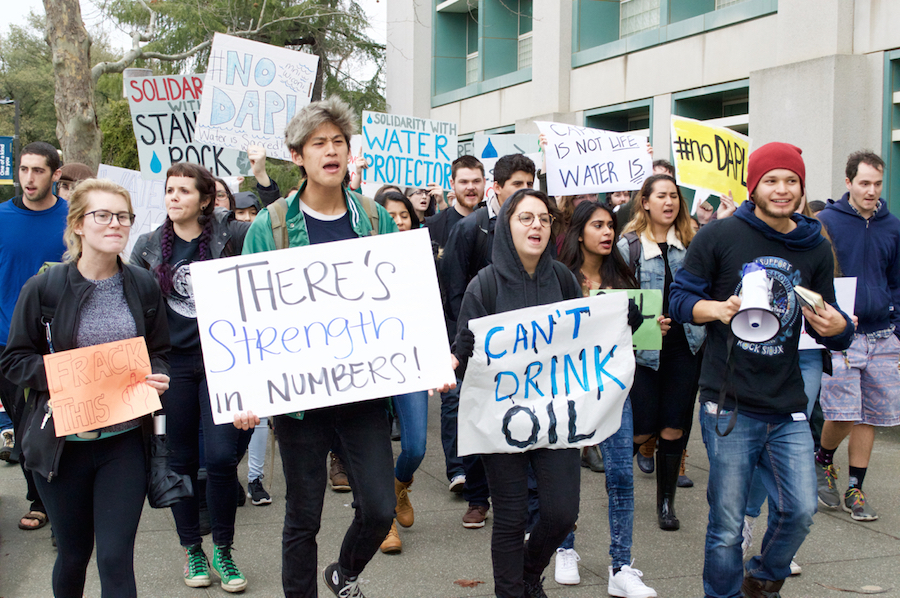
Student protesters march from MU flagpole to Mrak Hall
UC Davis students and community members protested the installation of the Dakota Access Pipeline (DAPL) on Thursday, Feb. 2. The protest was part of a larger scale UC-wide day of action, demanding that the UC regents divest from Energy Transfer Partners and Sunoco Logistics, two fossil fuel corporations involved in the construction of the DAPL.
The students met at the Memorial Union flagpole and marched through the Coffee House and Shields Library before heading to Mrak Hall. Led by UC Davis campus organizer Francisco Ferreyra, protesters held signs to demonstrate their solidarity with indigenous people and their land claims.
Ferreyra, a third-year regional and community development major and environmental sustainability officer at the UC Student Association, said the protest was organized so the community could stand up against the fossil fuel industry’s project, which may compromise clean water supply in Native American reservations.
“This pipeline will leak, as all pipelines do, and when it does it will potentially contaminate drinking water for 18 million Americans that depend on the Missouri River,” Ferreyra said. “And if this black snake is completed it will send a message to the country that the U.S. government cares more about corporate profits than the treaties it signed with Native Americans years ago.”
The pipeline’s potential detrimental effects on the surrounding environment are not the only reason why students protested. Last month, it was reported that the University of California Retirement Plan, managed by the Office of the Chief Investment Officer of the Regents, currently holds bonds in Energy Transfer Partners and Sunoco Logistics.
“It doesn’t make sense for one of the leading climate science institutions in America to invest in an industry that is killing the earth,” said Hanna Presiado, a first-year environmental science and management major.
With President Donald Trump’s executive order last month advancing the approval of the Keystone XL and Dakota Access oil pipelines, as he promised during his campaign, some students feel that the current administration’s stance on environmental policy does not reflect the will of the people and will be detrimental for future generations.
Josh Wertheim, a third-year anthropology major who participated in the protests at Standing Rock in North Dakota, expressed his concern for the environment and the pipeline’s impact on future generations.
“This is our world and we borrow the world from the future,” Wertheim said.
The appointment of former ExxonMobil CEO Rex Tillerson as Secretary of State has also riled supporters of environmental sustainability.
“Trump’s corporate colonial cabinet is hard at work ensuring that students like us will have no planet to enact our education onto,” Ferrerya said. “Climate denialism kills, and the fact that our Secretary of State is a former CEO of the largest oil company in the world is a sobering reminder that the climate catastrophe will only get worse unless the people can successfully step in.”
Written by: Kaitlyn Cheung — campus@theaggie.org









